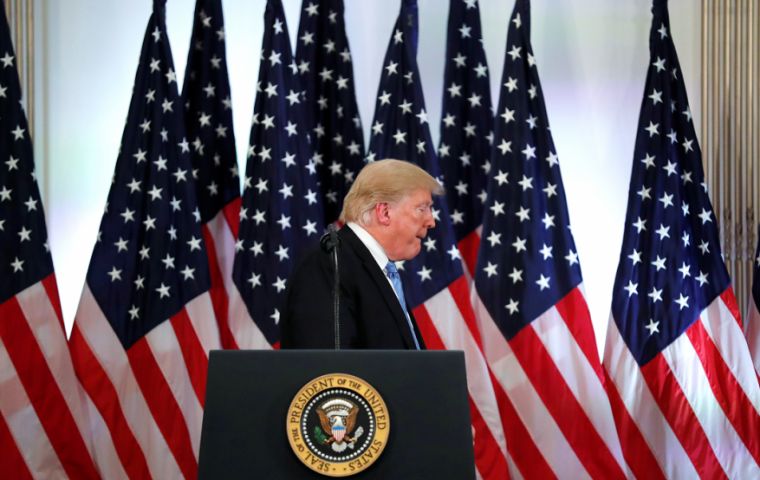MercoPress. South Atlantic News Agency
US professional diplomats question Trump/Pompeo policy focus and foreign aid cuts
 Morale is sinking amid signs US foreign policy is being dictated by a shoot-from-the-hip president and a Secretary of State with the political savvy to implement it
Morale is sinking amid signs US foreign policy is being dictated by a shoot-from-the-hip president and a Secretary of State with the political savvy to implement it  Trump and Pompeo defend their policies, arguing the United States can no longer be the world's police force or its benefactor
Trump and Pompeo defend their policies, arguing the United States can no longer be the world's police force or its benefactor The ranks of the United States' foreign policy establishment are being roiled once again by resignations, reports of partisan intimidation in the midst of looming massive cuts in foreign aid that critics in Congress and elsewhere contend weaken American diplomacy worldwide.
When Secretary of State Michael Pompeo took over the State Department 16 months ago, there was a surge in optimism that a dispirited corps would be reinvigorated after a tumultuous year of budget cuts and bungled management under ex Exxon Mobil CEO Rex Tillerson.
But morale is sinking amid signs that American foreign policy is now being dictated unchecked by a shoot-from-the-hip president and executed by a Secretary of State with the political savvy to actually implement those controversial policies.
That includes efforts to essentially revamp the United States' asylum programs, proceed with arms sales to Saudi Arabia despite bipartisan congressional opposition following the gruesome murder of a US-based journalist in a Saudi consulate, and overturning of decades of US policy in the Middle East by moving the US Embassy in Israel to the disputed city of Jerusalem and recognizing Israeli sovereignty over the Golan Heights.
In parts of the world and international venues where American influence was once king, the United States has lost influence or is not present, critics say.
Mr Pompeo has declined to get involved in a delicate dispute between Japan and South Korea, two key Asian allies whose cooperation is central to regional stability and negotiations with nuclear-armed North Korea.
Mr Pompeo will not attend this week's Group of 7 meeting of the world's top advanced democracies, leaving it to President Donald Trump - who last year stormed away from the summit and refused to sign a final document, the first time that has happened.
A communiqué this week from Western democracies offering support to the Hong Kong protestors facing off with China was signed by major world powers, but not the United States.
And in the coming days, the White House is expected to manoeuvre around legal hurdles to attempt to slash as much as US$4 billion in foreign aid that supports critical programs around the world, including peace-keeping missions, and development, educational and human rights projects.
“We are not in a good place for dealing with the next super-crisis overseas, nor ongoing great power competition,” said Ms Barbara Leaf, a retired 34-year veteran of the foreign service whose last post was as ambassador to the United Arab Emirates, on Twitter.
In an interview, she added, “We have lost decades of expertise vital to our national interests ... and we are stepping back a degree from the international engagement of the last 75 years that shaped” the world order.
For many diplomats the unconventional Trump approach has triggered an intense debate about whether to stay and promote good diplomacy, or leave an administration that violates their values.
One of State's most senior officials, the assistant secretary in charge of the Western Hemisphere, Ms Kimberly Breier, abruptly resigned this month after reportedly clashing with White House adviser Stephen Miller over his aggressive immigration policies. Several people said they expected additional departures in the coming weeks.
Another diplomat told the Los Angeles Times this week he was quitting in part because Mr Pompeo's State Department seemed to have little use for input from its experienced foreign service officers.
“We are serving a secretary of state who largely agrees with the president” instead of offering alternative viewpoints, said the diplomat, who is based in Latin America and requested anonymity because his resignation is pending. State's “is a largely empowering voice,” he added.
Mr Trump and Mr Pompeo defend their policies, arguing the United States can no longer be the world's police force or its benefactor. They say they are promoting a doctrine of “America first” that puts top priority on the prosperity and security of US citizens.
Speaking this week to the United Nations Security Council in New York, Mr Pompeo defended the administration's conduct of foreign policy, saying it was “reviving” America's leadership role by joining multilateral efforts that are “meaningful,” “effective” and “reflect the values of freedom-loving societies,” such as the battle against Islamic State in Iraq and Syria (ISIS) terrorism.
The “rescission” package, as it is known, freezes foreign aid money that Congress already approved for a 45-day review period. The fiscal year ends in September 30, meaning the money will almost certainly go unspent and be returned to the US Treasury.
The administration argues the action will help reduce the budget deficit. Agencies likely to be affected denied this, noting the money is a tiny fraction of the overall government budget.




Top Comments
Disclaimer & comment rulesCommenting for this story is now closed.
If you have a Facebook account, become a fan and comment on our Facebook Page!